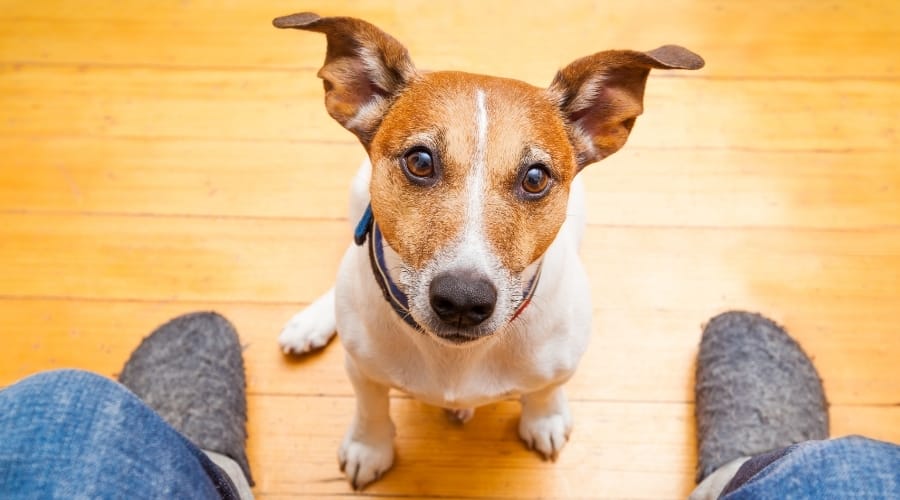Why Do Dogs Howl? 10 Weird Reasons You Won’t Believe
When you purchase through links on our site, we may earn a commission. Here’s how it works.
Your dog isn’t broken. They just really, really need to be heard. But why do dogs howl at sirens, songs, or the second you close the front door? Some do it for fun, others for attention, and a few might be warning you that something’s wrong.
Table of Contents
From getting your dog to howl on cue (yes, it’s a thing) to knowing when it’s time to call the vet, I’m breaking down the funniest, weirdest, and most important reasons why dogs howl, and how to quiet the chaos when it gets out of hand.
Why Does My Dog Sound Like a Furry Alarm System?
Let’s start with the classic question: why do dogs howl in the first place? Spoiler: like barking, howling is not just random noise.
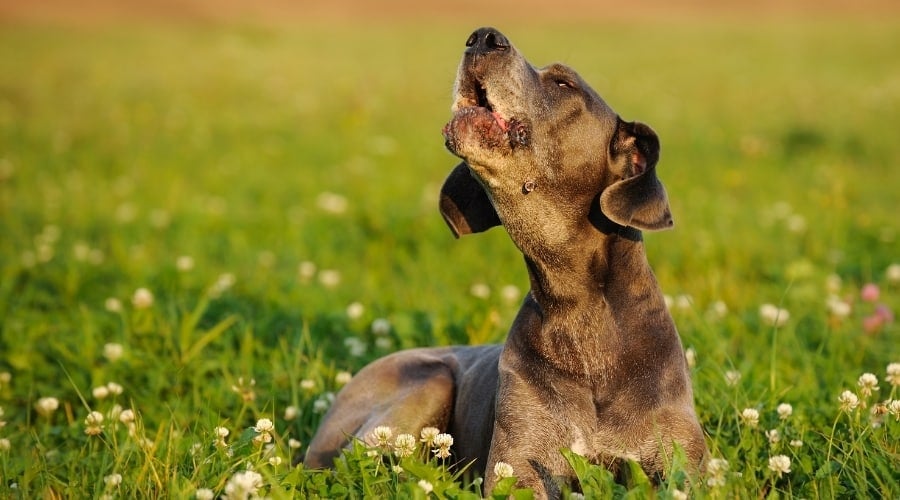
Howling is your dog’s way of talking, warning, locating, or just vibing hard with a fire truck. Here are the main reasons most dogs howl:
- Pack Talk: Descended from wolves, dogs use howls to say “I’m here!” or “Where are you?” especially when you leave the house.
- Territory Drama: If they hear another dog or weird outdoor sound, they might howl to say, “Back off, this is my turf.”
- Attention Craving: Some dogs figure out fast that howling = you looking at them. Congrats, you’ve been trained.
- Stimulated by Sound: High-pitched noises like sirens, music, or even your singing can trigger howling. It’s like a reflex karaoke session.
Howling is hardwired into many dogs. It’s their way of talking, like tail wags, ear flicks, and other dog body language signals.
Quick Tip: If your dog only howls when you’re gone, it could be separation anxiety. I’ll cover when to worry about dog howling later on.
10 Weird Things That Trigger Dog Howling
Dogs howl for all kinds of reasons, but some of these triggers are downright bizarre. From squeaky toys to your off-key singing, here are the most common and unexpected things that might turn your pup into a four-legged siren.
1. Your Singing
Ever belted out a power ballad only to hear your dog join in? Some dogs howl when you sing because they think you’re talking to them, or because they simply can’t handle your pitch. It’s not judgment. Probably…
Caught on camera: this dog doesn’t just howl, he performs. As the owner belts out a classic show tune, this pup jumps in with perfect timing, sometimes harmonizing, other times stealing the show solo. Watch this hilarious reminder that dogs can join the chorus.
2. Squeaky Toys
To human ears, squeaky toys are just a fun noise. But to dogs, that squeak mimics the sound of a small animal in distress. Some dogs howl at it, like they’re trying to “check in” or offer backup. Others go full predator mode and try to rip it to shreds.
They’re either trying to save it or finish the job. Depends on the vibe.
3. Ambulance or Fire Truck Sirens
These sounds are eerily close to howling tones in the wild. When dogs hear a siren, it activates their ancient pack instincts. Translation: “I hear you, strange mechanical wolf!”
4. You Howling at Them
Try it. Go ahead, howl at your dog. If they respond with a long, echoing call, congratulations: you just unlocked their karaoke mode. Many dogs can’t resist responding to their humans’ howls; it’s pack bonding 101.
5. Other Dogs Howling
Dog howls can spread like wildfire. Whether it’s a neighbor’s pup or a viral TikTok sound, your dog may instinctively join in. It’s less “misery loves company” and more “WE RISE TOGETHER.”
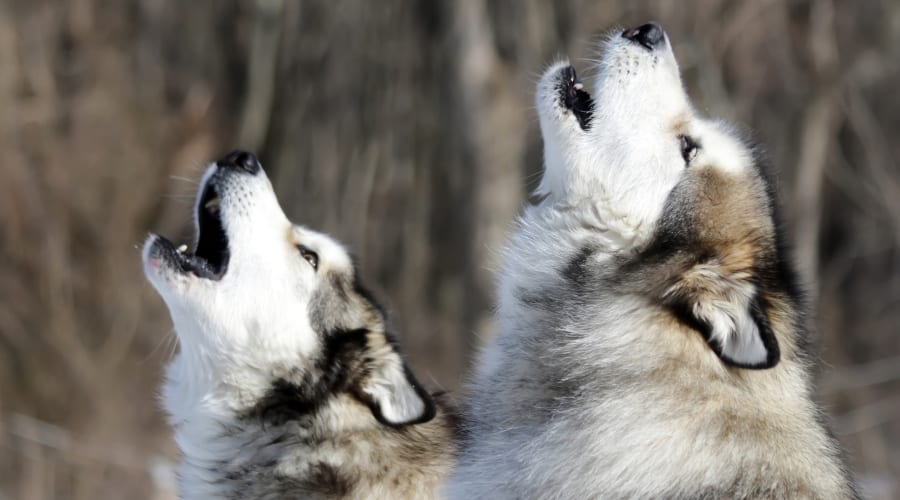
6. Crying Babies
There’s something about a baby’s wail that gets right to a dog’s brain. The tone mimics distress, so dogs may respond out of concern or confusion.
Some pups even seem to think the baby is just a tiny human howling, and they jump in like it’s a group performance.
7. Music
Some dogs are deeply moved by certain songs, and not in a chill, tail-wagging way. Instruments like violins, flutes, or harmonicas (especially ones with higher frequencies) can set them off.
The tones hit just the right emotional or instinctual notes, and suddenly your living room turns into a doggy opera house. Hilarious entertainment for you, maybe not for your neighbors.
8. High-Frequency Sounds
Microwaves, phone alerts, smoke detectors, even the ice maker. If it’s shrill, electronic, and slightly creepy, your dog may respond with a vocal protest.
9. Nighttime Loneliness
Ever hear your dog start howling just as you’re drifting off? It’s not random. When the lights go out and everyone heads to bed, some dogs feel the separation hard.
They miss their people, feel isolated, or get anxious in the dark. What sounds like a spooky midnight howl is often just your dog saying, “Hey… where’d everybody go?”
10. When You Leave
If your dog starts howling the second you shut the door, it might be their way of saying, “Where do you think you’re going without me?” It can signal separation anxiety, or just extreme FOMO.
Can All Dogs Howl?
Technically? Yes. Every dog can howl, but not every dog cares to. Some breeds are naturally more vocal, while others might only let out a howl once in a blue moon (or a fire truck).
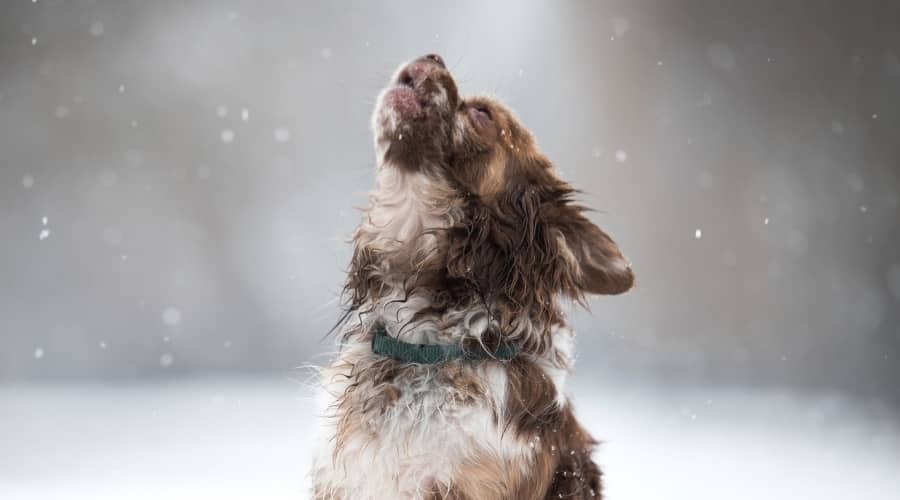
Next up, I list which dogs take howling to operatic levels.
9 Dog Breeds Who Are The Loudest Drama Queens
Not all dogs are big on howling, but for some, it’s practically a personality trait. There’s a lot to learn about dog evolution and what role wolves play in it.
Many studies have found that dog breeds genetically closer to wolves, like ancient or primitive breeds, are more likely to howl in response to wolf howls, while modern breeds showed less interest or reacted more playfully. This suggests howling is a partly inherited behavior, shaped by how close a breed is to its wild ancestry.
In addition, some breeds, especially hounds, also use a vocalization called baying. It is a deep, drawn-out bark that’s similar to howling but more grounded and rhythmic. Dogs like Beagles and Coonhounds often bay while tracking, signaling to hunters (or other pack members) that they’ve locked onto a scent.
So, let’s look at the following breeds that are genetically wired to be vocal, expressive, and sometimes downright extra.
1. Siberian Huskies
The reigning kings and queens of canine drama. Huskies don’t just howl, they monologue. Loud, theatrical, and wildly entertaining, their howls can sound like actual sentences. If your Husky isn’t howling, check if they’re asleep.
I once dog-sat four Huskies for a month, and let me tell you, the howling was next level. The moment one started, the rest chimed in like it was a planned performance. It didn’t matter if it was a siren, a sneeze, or complete silence. Once the chorus kicked off, snapping them out of it was almost impossible.
2. Alaskan Malamutes
Cousins to Huskies but with more bass. Alaskan Malamutes have a deep, resonant howl that can carry across a neighborhood. It’s majestic… until it’s 3 A.M.
3. Norwegian Elkhounds
One of the oldest dog breeds in existence, Norwegian Elkhounds were bred to track moose and bark in bursts to guide hunters. Their howls are sharp, loud, and relentless, especially when they’re excited or on high alert. If your Elkhound hears a squirrel blink, you’ll know.
4. American Eskimo Dogs
Don’t let the fluffy cuteness fool you, Eskies are talkers. American Eskimo Dogs are intelligent, alert pups who are quick to howl when excited, anxious, or left alone too long. Their howls tend to be high-pitched, sharp, and very, very persistent. They don’t just announce intruders, they narrate your mail delivery.
5. Beagles
Originally bred for hunting, Beagles use their voice to track and alert. Their howls (technically called baying) are deep, booming, and impossible to ignore. You don’t own a Beagle; you live with one very opinionated co-worker.
6. Bloodhounds
With deep, mournful howls that feel straight out of a gothic novel, Bloodhounds are the original sad singers. They’re scent-driven and often howl to alert you that they’ve found something, even if it’s just yesterday’s leaf.
7. Coonhounds
Bluetick, Black and Tan, Redbone – they’re all vocal powerhouses. Bred for night hunting, Coonhounds have a signature bay that’s both deep and echoing. When they pick up a scent or want attention, they let the entire county know.
8. Foxhounds
American and English Foxhounds were bred to hunt in large packs, so vocal coordination is their thing. Their baying is rhythmic, almost musical, and often nonstop when on the trail. Even off-duty, they love to practice.
9. Dachshunds
Surprise! These tiny sausages pack serious vocal power. Dachshunds were originally bred to flush out badgers, and their bark often turns into a long, drawn-out howl, especially when they’re bored or demanding snacks.
Quick Takeaway: If you’re not a fan of regular howling, you might want to steer clear of the above breeds or invest in noise-canceling headphones.
Is It Cute, Or Is Something Wrong?
Some dog howls are adorable, hilarious, and even sing-along-worthy. Others? Not so much.
While many breeds are just naturally vocal (hello, Huskies), howling can also signal that something’s off. So, how do you tell the difference between a harmless performance and a howl for help?
Normal Howling Looks Like This
- Triggered by sirens, music, or other dogs
- Happens occasionally and sounds playful or expressive
- Stops when the trigger ends or with a quick distraction
- Part of a known behavior pattern in vocal breeds

Red Flags to Watch For
- Howling starts suddenly and frequently, with no clear trigger
- Happens mostly when the dog is left alone (separation anxiety)
- Occurs at night with restlessness or pacing
- Paired with whining, destructive behavior, or clinginess
- Sounds strained, panicked, or more intense than usual
Quick Tip: A sudden spike in howling can signal pain, fear, cognitive decline in senior dogs, or even underlying illness. Keep an eye on other changes like appetite, energy, or bathroom habits, and when in doubt, call your vet.
And don’t overlook boredom. Many dogs howl simply because they’re under-stimulated. Thankfully, that’s fixable…
7 Ways To Prevent Unwanted Howling
If your dog’s howling is more chaos than charm, the good news is: it’s often manageable. Whether it’s boredom, anxiety, or just a case of attention-seeking drama, here are effective ways to reduce or prevent unwanted howling.
1. Tire Them Out (Mentally and Physically)
Most howling isn’t about emotion, it’s about energy. Dogs that don’t get enough exercise or stimulation will often vocalize just to do something. Daily walks, tug-of-war, fetch, and sniffing games all help burn off that extra energy.
Pro tip: Let your dog “sniff walk” (slowly exploring scents) for mental exhaustion. It’s surprisingly effective.
2. Use Puzzle Toys & Chews
When you leave the house, don’t just say goodbye, give them a job. A stuffed Kong, lick mat, or long-lasting chew provides your dog something to focus on instead of your absence.
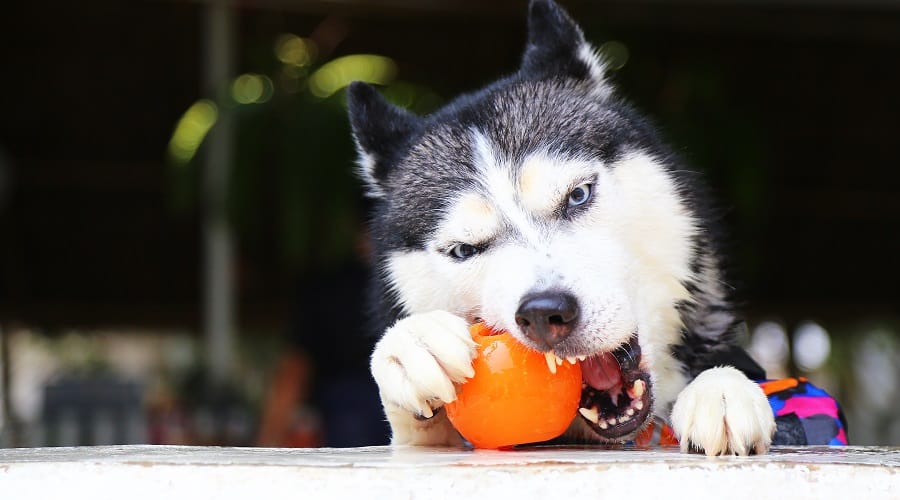
Try this: Freeze peanut butter or wet food inside a Kong to keep your dog occupied for 20+ minutes.
3. Create a Calm-Down Space
Overstimulated dogs often vocalize out of frustration. Designate a quiet, cozy spot in your home with familiar scents, a soft, calming bed, and perhaps a calming playlist or white noise machine.
Bonus: Products like calming dog treats or thunder shirts may help reduce anxiety-related howling.
4. Teach a “Quiet” Cue
Wait for a calm moment (even just 3 seconds of silence), say “quiet,” then immediately reward with a treat or praise. Over time, your dog will learn to associate silence with rewards, and the cue will work when they start howling.
Important: Only reward calm (rather than just silence) that follows a barking fit. Timing is key.
5. Avoid Accidentally Rewarding the Howl
If you give your dog attention every time they howl, good or bad, they’ll learn it works. Instead, ignore the noise and reward when they stop. It might feel tough at first, but consistency pays off.
What not to do: Don’t yell. They might think you’re just joining in the howling fun.
6. Consider a No-Bark Collar
Some owners turn to no-bark collars, which use sound, vibration, or a mild static correction to interrupt howling. You can try an online dog training course, a sonic collar, a no-bark dog collar, or a combination of all three.
These can be effective in the short term, but they’re best used alongside behavior training, not as a stand-alone fix.
Always choose humane, vet-approved models and avoid using them on anxious or senior dogs without professional input.
7. Call In a Pro
If the howling is intense, anxiety-driven, or tied to separation, a certified dog trainer or dog behaviorist can help you create a customized plan.
5 Red Flag Howls: When To Call Your Vet
Not all howls are harmless. While many dogs vocalize for attention or fun, sudden or excessive howling can signify something deeper. Here’s when it’s worth picking up the phone and talking to your vet:
1. Sudden Behavior Change
If your dog has never been much of a howler and suddenly starts vocalizing constantly, or at strange times (like 2 A.M. or while just sitting still), it could signal pain, illness, or confusion.
2. Howling With Other Symptoms
Red flags to watch for:
- Limping or stiffness
- Loss of appetite
- Whining, pacing, or clinginess
- Panting or drooling without exertion
- Accidents in the house (especially in trained dogs)
These signs, paired with howling, can point to discomfort or distress. It could signify health concerns like joint pain, digestive issues, or neurological changes.
3. Senior Dog Suddenly Howling
Older dogs who start howling out of nowhere may be showing early signs of cognitive dysfunction syndrome (similar to dementia in humans). This type of howling often happens at night and may include confusion or anxiety.
4. Unmanageable Separation Anxiety
If your dog howls every time you leave, even with toys, training, and time, it may be dealing with full-blown separation anxiety. This isn’t just behavioral; it can affect their health and well-being.

5. Howling After an Injury or Illness
Even after treatment, some dogs may howl due to lingering pain, fear, or discomfort. Always follow up if behavior shifts after a health event.
Bottom Line: You know your dog best. If something feels off and the howling doesn’t fit their typical vibe, it’s worth getting a professional opinion. Speak to your vet, and if there are no underlying health concerns, they might recommend speaking with a trainer or dog behaviorist.
Can I Make My Dog Howl (On Command)?
Short answer: Yes, and it’s hilarious.
Some dogs howl at sirens. Others? At harmonicas, babies, or that one high note in your favorite song. If your dog’s the vocal type, you can absolutely train them to howl on cue and turn it into a fun little party trick.
Try These Sound Triggers
Here are a few common sounds that often spark howls:
- High-pitched singing or whistling
- Siren or alarm sound clips (YouTube has tons)
- Harmonica or flute music
- Another dog howling (yes, even through your phone)
Tip: Watch your dog’s ears and tail. If they perk up, you’re close.
How to Train a “Howl” Cue
- Catch Them in the Act. If your dog howls naturally, wait for it, then say a cue like “Sing!” and reward right after.
- Mark & Reward. As soon as they vocalize, say your cue word and give a treat or praise.
- Repeat & Reinforce. Eventually, you’ll be able to say “Howl!” and get an encore performance.
Not all dogs howl, even with encouragement. Some just aren’t talkers, and that’s okay. But if yours is, you’ve got yourself a furry little performer.
FAQs: Why Do Dogs Howl?
Got more questions about the meaning of dog howling? Here are a few that we get all the time. Plus, we’d love to hear yours in the comments! So, please ask away.
Why Do Dogs Howl At Sirens?
Have you ever heard dogs howling at sirens? With enough prompting, most dogs will howl along with sustained noises like sirens, which mimic the low-to-high sound of a classic howl.
Why Do Dogs Howl When You Howl?
You might coax your dog to sing along with you if you hold specific notes in your favorite song. This type of howling might be akin to cheerleading, a common practice among wolves that involves short-duration howls, yips, and yodels meant to pump up the pack before a hunt.
Why Do Dogs Howl At Night?
Howling in pet dogs can indicate separation anxiety or loneliness. This fear may explain why dogs howl at night more than during the day. The next time you go out to dinner or a late movie, circle around the block and take a listen in front of your house.
If you hear a low-pitched wailing, your dog may just be missing you and trying to call you back home as their wolf cousins would do.
Why Do Dogs Howl To Music?
Music has a variety of sounds and pitches. A dog may begin to howl to music to respond to the sounds the human ear can hear, and maybe even some sounds that only dogs can hear.
Why Do Dogs Howl At The Moon?
Dogs may tend to howl more at dusk or dawn, so that may be why people assume they are howling at the moon. It could also be related to an increase in brightness, meaning more to see than when it’s darker.
Why Do Dogs Howl When You Leave?
If your dog howls every time you leave the house, you might be dealing with separation anxiety. This fear can be a severe stressor for your pup.
Why Do Dogs Howl When You Sing?
Dogs often howl when they hear higher pitch sounds and may also interpret singing as a form of howling, so they feel the need to respond.
Why Do Dogs Howl Together?
Since howling can be a sign of communication, it makes sense that dogs often howl together. They are simply responding to one another.
Why Do Dogs Howl At Squeaky Toys?
Squeaky toys may sound like prey to your pup, causing them to howl. A dog may also want to announce to everyone that this toy is their possession.
Why Do Dogs Howl When Babies Cry?
A dog may howl when a baby cries because they may interpret it as a baby’s howl and want to join in. The pup may also be trying to communicate with their owner to pay attention and help the crying baby.
Why Does My Dog Howl In Their Sleep?
If you notice a dog howling in their sleep, the most likely reason is that they’re dreaming. It may also signify an unpleasant dream where the pup is agitated.
Why Is My Dog Howling All Of A Sudden?
Sudden onset of howling could mean your pup is sick or hurting. Be sure to check with your vet if your dog starts howling and it’s out of character for them.
How Do I Stop My Dog From Howling?
Is your dog howling so much that they should be on the next season of American Idol? Don’t worry. There are remedies to help your dog keep an inside voice.
Curious Dog? Curious Human? We’ve Got More…
You’re in the right place if you’re still wondering why your dog acts like a tiny furry weirdo. From whining to sniffing your guests’ crotches (yes, that’s a thing), dogs have a lot of behaviors that seem bizarre until you dig into the reasons.
Want to know why some dogs eat poop, spin in circles before they poop, or randomly bark at the ceiling fan? We’ve covered it all. So before you go, check out the rest of our dog behavior guides, because the howling is just the beginning.
Does your dog sing along with sirens? Howl at your harmonica? Or start a full-on midnight concert for no reason at all? Drop your funniest, weirdest, or most heart-melting howling moments in the comments, because we’re all ears (and tails).
